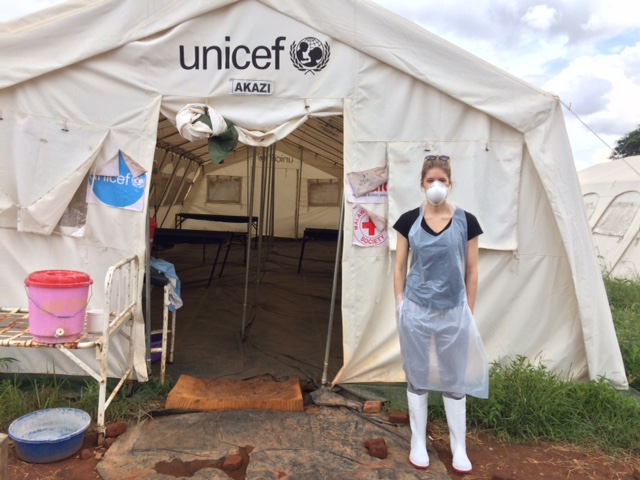‘He just collapsed and died on the road as he was coming here’- The District Health Officer who oversees the cholera treatment facility in Lilongwe, Malawi, talks about the latest cholera death- a Chief from a neighbouring village. ‘Cholera is a big taboo in the country’, she says, ‘Many community members opt not to use cholera treatment facilities in fear of the stigma and shame associated with the disease. They only begin their journey to the centre when they are on the verge of death…and then it’s too late’, she says solemnly.
Cholera is an acute diarrheal infection caused by drinking contaminated water- cholera is a fast, terrifying killer. The disease can kill within hours if left untreated. Bacteria called Vibrio cholerae produce a toxin that binds to cells of the small intestine, setting off a series of reactions in which cells pump out large amount of chloride ions and water- up to five gallons a day. If salts and water are not quickly replaced, the patient dies. Cholera remains a significant threat to public health, and a major cause of mortality in Sub-Saharan Africa. The disease is currently impacting the wider southern African region.
In late November 2017, a cholera case appeared in Malawi, thought to have come from Zambia. Cases have continued to rise ever since. Cholera often coincides with the annual rains and floods in Malawi- but this year it’s different. Since January, an unusually high amount of cases have been recorded. As of March 2018, over 600 cases have been registered. The Ministry of Health has recorded 17 deaths. With the rainy season continuing into May and June, health authorities worry about the escalating outbreak.
In March, MANEPO and World Vision Malawi raised an anticipation alert through the Start Fund to address the escalating outbreak. The two agencies are working closely with local health authorities to contain the outbreak and mitigate its spread into other districts, by identifying and addressing gaps in local government cholera contingency plans. The alert is providing local health offices with supplies to manage cholera cases. It also focuses on prevention, through chlorine water treatment and community sensitisation campaigns. This ensures that communities are aware of the importance of chlorinating water to prevent the disease. ‘We’ve never worked this closely with charities before on cholera containment and prevention’, says the Salima District Health Officer, ‘We welcome this initiative’, he adds.
Start members are also working in communities at risk of a potential outbreak in the future- such as Chimbalanga village in Palombe district. The fishing village, located on the shore of a lake, has been identified by local authorities as a potential ‘hotspot’ as community members are more likely to encounter contaminated water. The local lake has been a source of contamination in the past.
Chimbalanga Village
A pickup truck drives slowly up and down the main village road. Music is playing from two large speakers in the truck. Two village members stand in the back of the truck calling out to village members using a microphone connected to the sound system.
Community members in Chimbalanga village get ready to promote the cholera awareness programme in the village.
The community is being invited to a cholera awareness programme at the local school, which is being supported through the Start Fund alert. Village members begin to gather at the school. Within 30 minutes, more than 700 villagers have congregated.
Some of the crowd which has gathered in Chimbalanga village for the cholera prevention programme which is being supported through the Start Fund alert.
The Village Chief of Chimbalanga, age 84, gets up to speak. The crowd steadily claps their hands together in unison as he approaches the front of the crowd- a sign of respect. ‘In all my years, I’ve never seen a crowd like this gather in this village to talk about cholera’, the chief tells the attentive crowd, ‘You have to listen to these messages. We have to defeat cholera!’- the crowd cheers. The next hour is filled with song and dance about cholera prevention, a (very comedic) play, and information is shared from MANEPO and local health authorities about how to identify cholera symptoms and what should be done if cholera is suspected. ‘If you want to share a message in Malawi, you have to make it entertaining. People don’t want to be lectured about cholera, you have to use a medium that will make people listen’ explains a MANEPO staff member who is managing the Start Fund alert.
The Village Chief speaks to the village about cholera prevention during a cholera awareness campaign being supported through the alert.
‘You have to listen to these messages. We have to defeat cholera!’, the Village Chief
MANEPO, a Malawian network of over 40 charities who are working to promote the well-being of the elderly, has a particular interest in mitigating the spread of cholera. ‘The elderly are very vulnerable to this disease’, explains Andrew Kavala, the Director of MANEPO. ‘When we talk about cholera prevention, older men and women have been side-lined in the past. The messages often don’t reach them. This alert is a great opportunity to prepare them. This alert will save lives- lives of the most vulnerable’.
This response is part of Alert 220 Malawi - anticipation of Cholera and is estimated to reach 2,750 people in 45 days.

